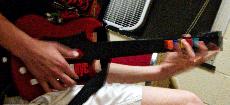
It’s 7:30 p.m. on a Thursday, and Charlie Mrusko’s dorm room on the sixth floor of Easton Hall is filled with onlookers, each waiting for their chance to play.
“Who’s up next?” freshman Lee Fisher asks loudly. “Can I get next?”
The object of the gathered students’ affection is a guitar, but this instrument has only one string and five frets, a far cry from the normal six-string, 19-fret guitar. And this guitar’s cord doesn’t lead to an amplifier, but instead leads to a PlayStation 2.
And in that PlayStation 2 is a copy of Guitar Hero II, one of the more unique and popular video games in recent memory. Rather than allowing people to pretend they are super-soldiers, like in Halo 2, or letting them manage their favorite football franchise like in the Madden games, the Guitar Hero series gives gamers the chance to live out another fantasy: becoming gods of rock ‘n’ roll.
The game’s concept is similar to previous music-based video games like Dance Dance Revolution. But instead of following arrows and stepping on a dance pad, players follow a scrolling screen of cues telling them when and for how long to press down on one of the guitar-like controller’s five buttons.
Mrusko, a freshman letters and sciences major, got the game over winter break. When he first heard about the game from friends, he was skeptical. “How cool can a plastic guitar be?” he wondered.
The answer: pretty damn cool. The first three days back on the campus after winter break – when no one had class – the stream of people wanting to play Guitar Hero II, “the best video game” Mrusko has ever played, was constant, he said. And the game has been praised by critics as well – it has received five awards from the popular video game website IGN.
Earlier that Thursday night, Mrusko was ready to rock. Sitting in his dorm room, he picked up the controller and readied himself to play. Before ripping into “The Beast and The Harlot” by Avenged Sevenfold, Mrusko warned he might not be able to answer too many questions.
“As I play, I probably won’t be able to talk,” Mrusko said. “It gets a little crazy.”
The craziness of Guitar Hero II has allowed it to overcome its $80 price tag – the heftier price includes the guitar controller – to become the fifth-best selling game of 2006, despite only being released in November, according to NPD Group, an organization that tracks video game sales. The original Guitar Hero was released in November 2005, and a version of Guitar Hero II came out for the Xbox 360 console earlier this month.
But just because someone has mastered the Guitar Hero games doesn’t mean he or she can actually play the guitar, fans said.
“The beauty of this game is that it makes you feel like you’re really good at guitar,” Mrusko, who also actually plays guitar, said. “It makes you feel like anyone can play, but, in reality, it’s just a false hope.”
Playing a real guitar is “like playing six Guitar Hero guitars,” he added.
But that fine line between fantasty and reality doesn’t stop people from imagining. Want to be Slash from Guns ‘N’ Roses? Just play “Sweet Child O’ Mine.” Want to rock with Lynyrd Skynyrd? You can jam on their southern rock epic “Free Bird.” Or, for some reason, do you want to be a member of Honest Bob and the Factory to Dealer Incentives? Go ahead, play “Soy Bomb.”
Most of the game’s 64 songs are performed by cover bands, but a few are the originals. The songs cover a broad range of varieties and genres. The Xbox 360 version, released April 3, contains 10 additional songs, including Iron Maiden’s “The Trooper” and Pearl Jam’s “Life Wasted,” and more songs will be available for download via Microsoft’s Xbox Live service.
And for Guitar Hero aficionados, the songs certainly matter.
“I think Guitar Hero appeals to people who like good music,” said Molly Rose, a freshman who plays the game “as often as possible” and, like Mrusko, lives on the sixth floor of Easton.
Similarly, freshman Courtney Nelms, who enjoys Guitar Hero because “it makes me feel like I can play guitar like a beast,” said the game has helped her to better appreciate the classic rock genre.
But the difficulty levels of the songs vary dramatically. For example, “Surrender” by Cheap Trick is considered easy.
“To put in perspective, my dad passed this song,” Mrusko said, as his floormate, freshman journalism major Thomas Floyd, a novice player, played “Surrender.”
On the opposite end of the difficulty scale is “Jordan” by Buckethead, which Mrusko said is the hardest song in the game.
“It’s not comprehendible,” Mrusko said of the one song in the game he can’t beat.
But fans like Mrusko do have some reason to worry about the future of the Guitar Hero series. According to Internet rumors, Guitar Hero III will be developed by Neversoft, not Harmonix, who developed the first two games. Harmonix was purchased by MTV last year and is now working with MTV and video game giant Electronic Arts to develop Rock Band, which the company is billing as “The Ultimate Interactive Music Videogame Experience.”
But for now, students will revel in a game that is simply “addicting,” Mrusko and others said. And why is the appeal of the game so massive? Matt Liebowitz, a freshman finance major, perhaps has the best explanation: “Guitar Hero is the only way that mere mortals like us can rock,” he said.
Contact reporter Kevin Robillard at diversions@dbk.umd.edu.



